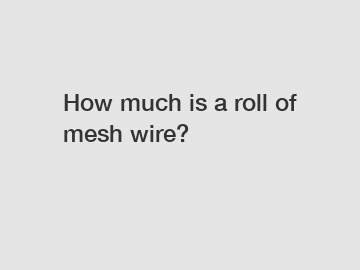How much is a roll of mesh wire?
Having a basic understanding of the cost factors involved when purchasing mesh wire can go a long way in ensuring you make an informed decision. Whether you're looking to fence your property, construct a chicken coop, or engage in any other project requiring a sturdy wire material, knowing how much a roll of mesh wire typically costs will help you budget effectively. In this blog, we will delve into the various aspects that influence the price of mesh wire rolls, helping you make an educated purchase.
1. Types of Mesh Wire:
The first element to consider is the type of mesh wire you need. Mesh wires come in a range of sizes and materials, each with its own merits and price points. The most common types of mesh wires include galvanized, stainless steel, and PVC-coated wires. These offer varying levels of strength, durability, and corrosion resistance, which in turn affect their respective prices.

2. Wire Thickness:
The gauge or thickness of the wire is another significant factor impacting the cost of mesh wire rolls. Manufacturers produce mesh wire rolls with different wire thicknesses to meet specific requirements. Thicker wires tend to be sturdier, more resilient, and thus more expensive. However, the gauge of wire required depends on the intended use, and balancing functionality and cost is crucial.
3. Mesh Size:
Mesh size refers to the spacing between the wires, typically measured in inches or millimeters. Smaller mesh sizes require more wires, thus increasing material costs. Conversely, larger mesh sizes can reduce expenses, but might compromise on certain applications' efficiency. Consider your specific project needs to strike the right balance between cost and functionality.
4. Roll Length and Width:
The dimensions of the mesh wire rolls play a part in determining their price. Longer and wider rolls naturally require more materials, resulting in higher costs. Consider the extent of your project and choose a roll size that satisfies your requirements without pushing your budget limits.
5. Quality and Brand Reputation:
Purchasing mesh wire rolls from reputable manufacturers known for their high-quality products often incurs a slightly higher price. Investing in trusted brands ensures that you get a product that is reliable, long-lasting, and meets industry standards. While this may increase up-front costs, it can save you money in the long run by reducing the need for frequent replacements or repairs.
6. Additional Features:
Some mesh wire rolls come with additional features that impact the price. For example, certain wires have anti-climbing properties or are designed to deter pests, which can increase the overall cost. Evaluate whether these extra features are necessary for your particular project or if you can achieve the desired outcome with a standard roll.
7. Market Conditions and Supplier:
Lastly, market conditions and the supplier you choose can influence the cost of mesh wire rolls. Prices fluctuate based on factors such as raw material availability, global demand, and economic conditions. Research multiple suppliers and their prices to ensure you get the best deal without compromising quality.
Conclusion:
Knowing the price range for a roll of mesh wire is essential when planning any project that involves these materials. By considering aspects such as wire type, gauge, mesh size, dimensions, quality, additional features, and suppliers, you can make an informed purchase decision based on your specific requirements and budget. Remember, while cost is a crucial factor, it should not overshadow the need for quality and longevity. Ensure you strike a balance between price and functionality to achieve the best outcome for your project.
If you are looking for more details, kindly visit stainless steel wire mesh panels, 2x2 galvanized wire mesh, black stainless steel window screen .
214
0
0

Comments
All Comments (0)